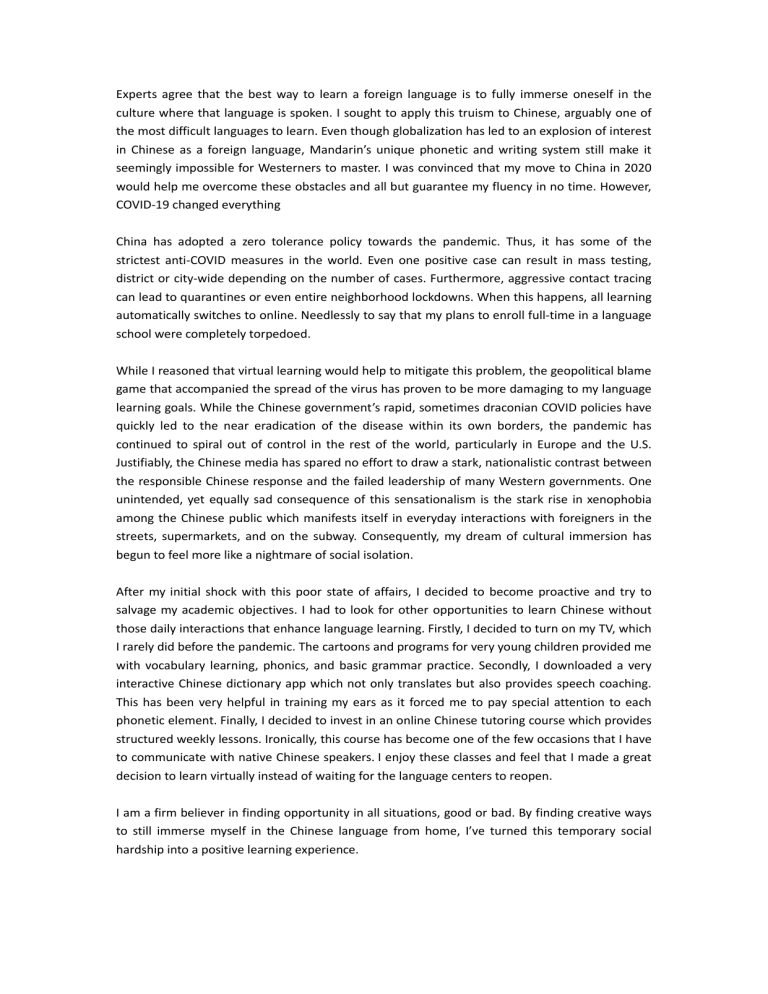
Experts agree that the best way to learn a foreign language is to fully immerse oneself in the culture where that language is spoken. I sought to apply this truism to Chinese, arguably one of the most difficult languages to learn. Even though globalization has led to an explosion of interest in Chinese as a foreign language, Mandarin’s unique phonetic and writing system still make it seemingly impossible for Westerners to master. I was convinced that my move to China in 2020 would help me overcome these obstacles and all but guarantee my fluency in no time. However, COVID-19 changed everything China has adopted a zero tolerance policy towards the pandemic. Thus, it has some of the strictest anti-COVID measures in the world. Even one positive case can result in mass testing, district or city-wide depending on the number of cases. Furthermore, aggressive contact tracing can lead to quarantines or even entire neighborhood lockdowns. When this happens, all learning automatically switches to online. Needlessly to say that my plans to enroll full-time in a language school were completely torpedoed. While I reasoned that virtual learning would help to mitigate this problem, the geopolitical blame game that accompanied the spread of the virus has proven to be more damaging to my language learning goals. While the Chinese government’s rapid, sometimes draconian COVID policies have quickly led to the near eradication of the disease within its own borders, the pandemic has continued to spiral out of control in the rest of the world, particularly in Europe and the U.S. Justifiably, the Chinese media has spared no effort to draw a stark, nationalistic contrast between the responsible Chinese response and the failed leadership of many Western governments. One unintended, yet equally sad consequence of this sensationalism is the stark rise in xenophobia among the Chinese public which manifests itself in everyday interactions with foreigners in the streets, supermarkets, and on the subway. Consequently, my dream of cultural immersion has begun to feel more like a nightmare of social isolation. After my initial shock with this poor state of affairs, I decided to become proactive and try to salvage my academic objectives. I had to look for other opportunities to learn Chinese without those daily interactions that enhance language learning. Firstly, I decided to turn on my TV, which I rarely did before the pandemic. The cartoons and programs for very young children provided me with vocabulary learning, phonics, and basic grammar practice. Secondly, I downloaded a very interactive Chinese dictionary app which not only translates but also provides speech coaching. This has been very helpful in training my ears as it forced me to pay special attention to each phonetic element. Finally, I decided to invest in an online Chinese tutoring course which provides structured weekly lessons. Ironically, this course has become one of the few occasions that I have to communicate with native Chinese speakers. I enjoy these classes and feel that I made a great decision to learn virtually instead of waiting for the language centers to reopen. I am a firm believer in finding opportunity in all situations, good or bad. By finding creative ways to still immerse myself in the Chinese language from home, I’ve turned this temporary social hardship into a positive learning experience.




